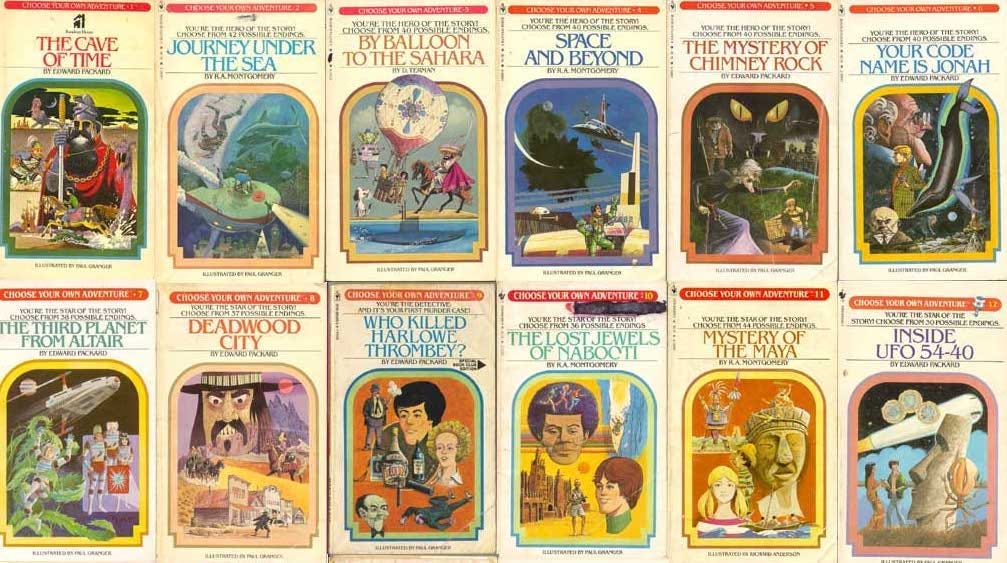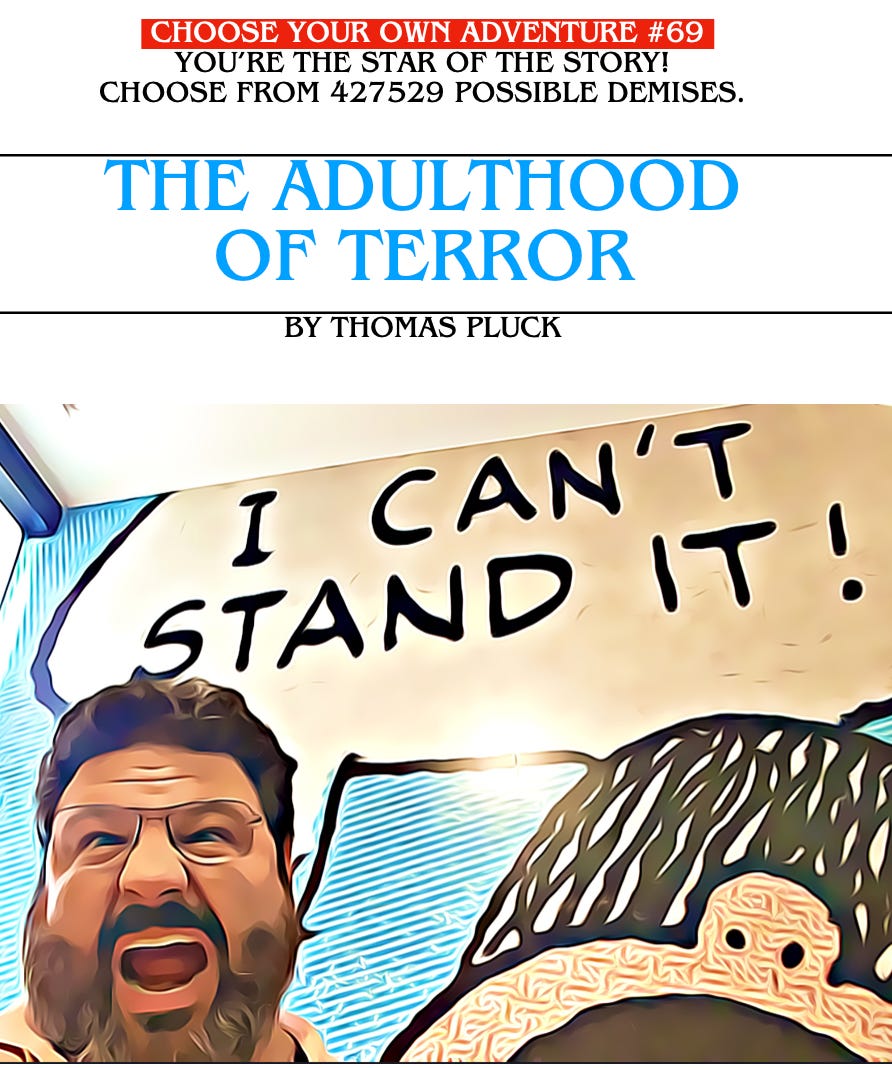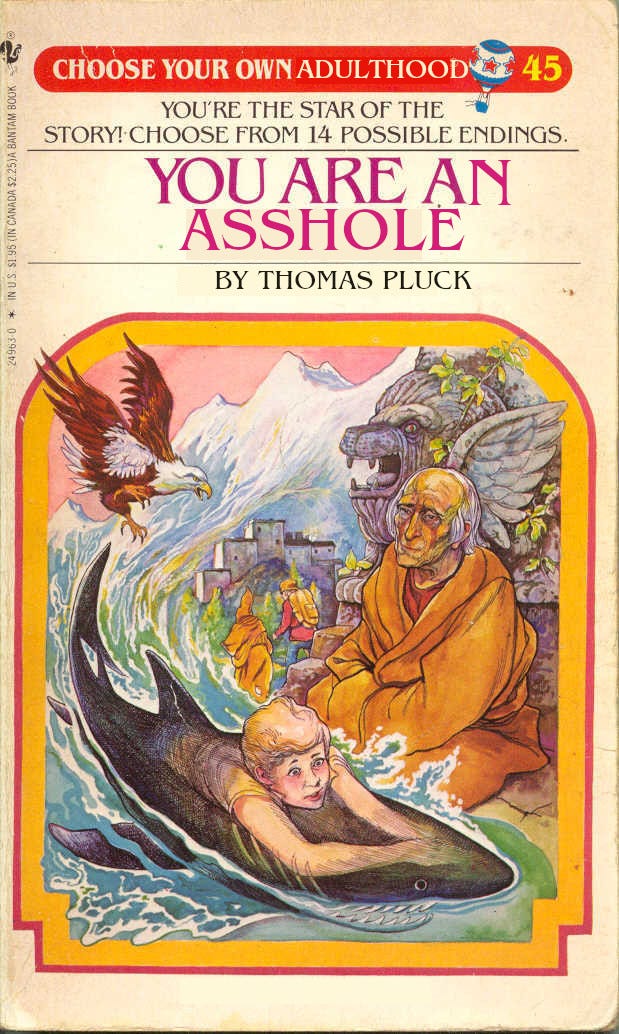Choose Your Own Anxiety: The Adulthood of Terror
Living a beloved childhood book series can be a nightmare
In ancient Rome
There was a poem
About a dog
Who found two bones
He picked at one
He licked the other
He went in circles
He dropped dead
Maybe in a different family, I would have known I suffered from anxiety before I was in my forties. My grandmother talked about her “worry beads.” Doom was always around the corner; blue collar fatalism is real, as evident in the gallows humor we use to survive, and the mantra, “what ya gonna do?”
The conundrum of choice has been debated for over a thousand years. Devo used poetic license to tell the paradox of Buridan’s ass1: a donkey that can’t decide between two bales of hay, and starves to death. Every day, we are confronted with dozens of choices, and have to make decisions on which is the “best.”
If you grew up in the eighties, you were trained for this with the Choose Your Own Adventure books. With their iconic cover art and deceptively simple narratives—which often led you to bizarre outcomes—we ate them up, finally given a chance to make our own choices. If you’re unfamiliar with the books, I’ll describe them briefly: they are short interactive novels that put you into the head of a character in a fanciful situation, and there are several paths you can follow, making decisions like the one below:
You awaken in a strange house, in a bed that it is not your own. You have no recollection of the last night. A pile of clothing is folded neatly at the foot of the bed. A brisk breeze blows in through an open window, and flowers peek over the sill, from a trellis leading down. Your mind is fuzzy, and as you dress yourself in the oddly colored clothes, you hear the clatter of plates from beyond the open door, and you smell something cooking.
One thing you seem to recall? You live alone.
“Wakey wakey, eggs and bakey,” calls a voice you don’t recognize. “You have a long day ahead of you.”
If you want to see who’s cooking breakfast, turn to page 7.
If you’d rather climb out the window, turn to page 11.
If you want to pretend you’re asleep, turn to page 9.
“You can’t go back!” they cried, but of course you could, and did. Some decisions would lead to your death. Others would lead to awful futures, as in The Cave of Time, where you could alter history. Some were more whimsical. The best books were less linear, and had more than one path that could be considered “winning,” though there was always a “best ending” that you tried to achieve. Others were repetitions of “The Lady and the Tiger,” with one choice that led to survival, and others that led to horrible deaths. (There was one infamous book with a solution that you could only reach by cheating, which you can find out about in this excellent remembrance of the series, including an interview with the surviving member of the pair of creators, by Leslie Jamison.)
Having all those choices turned books into a game, and gave agency to we Cold War children, when we were fed up with teachers and parents telling us what to do, and feeling helpless and hopeless in the face of inevitable nuclear holocaust. The books amplified the escapism of reading, because we didn’t only get to live in someone else’s head, we got to make their decisions for them. (If you’re feeling nostalgic, the books are in print and collected into convenient sets.)
Little did we know that once we were adults, those choices would all fall on us:
If you’re lucky, some time after your twenties, your friends and peers will stop dying in accidents and drug overdoses, and start dying of diseases, alcoholism, and suicide. That’s when you begin to face a different kind mortality; you started wearing your seat belt, but now you’ve got to decide whether to quit smoking, swap that fried chicken biscuit for a seven grain breakfast burrito, and consider if every meal really requires bacon.
The average lifespan of Americans dropped precipitously after the pandemic. Flossing your teeth every day and taking fish oil both reduce the incidence of heart disease by 5%.
If you’d like to keep eating grilled food, even though it is linked to bowel cancer, turn to page 187 (the LAPD code for homicide).
If you’d rather eat boiled vegetables and suffer needlessly, like your Irish ancestors, turn to page 45, ye fooker.
In a consumer culture, the illusion of choice is paramount, lest we see how few choices we actually have. So there are twenty kinds of yogurt, but they all use immense amounts of water, create plastic waste, and dumping whey acids into the enviroment. And most of them taste like shit, unless they are loaded with fat and sugar, because our taste buds have been love-bombed by the American food industry and can’t enjoy natural flavoring.
If you’d like to spend an hour reading all the labels and confirming the information on your phone, turn to page 86 (never mind, just skip to the end. no time!)
If you’d rather eat dirt and cry, turn to this page and read it over and over again.
There’s a phenomenon among “green-minded” people, where you freeze before throwing out a tissue or flushing it down the toilet. Or similar. Which is better for the Earth? If you don’t already have anxiety, the plethora of decisions we can make every day will give you a taste of what it’s like. And as in the CYOA novels, they all feel like the wrong choice will doom you, or the entire planet.
If you want to destroy the planet, turn to page 8.
If you’d rather spend all day foraging for wild beets, turn to page 21.
Not that one more tissue down the sewer is going to overburden the waste treatment plant. Or that most individual decisions will have much bearing on the outcome of the climate apocalypse, when corporate decisions can overrule the choices of a million people. If you think that’s hyperbole, you forget that I love to mention that one single container vessel pollutes as much as 50 millions cars. How many Teslas have even been sold?2
And while I love to trot that one out, I don’t think it means that our choices don’t matter at all. After all, this isn’t a Choose Your Own Adventure novel; we can only make choices for ourselves. And we don’t have to embrace Effective Altruis—and live with a bunch of roommates so we can donate every spare tuppence to whatever the “most efficient charity” is this week—to make a difference. I’ve flirted with veganism3 for years, and I’m making more of an effort now that the cheese doesn’t taste like expired candy corn.
I still like a good steak. I’ll even cheat and eat a bite of Sarah’s steak, so the moral stain is on her soul, not mine. But I don’t need factory farm food on my plate every day. And I don’t feel like buying a deep freeze so I can share a humanely raised cow with five neighbors.
Because getting to that requires a dozen decisions: should the cow grass-fed? What about the slaughterhouse. Temple Grandin didn’t design all of them, will our cow die in terror? How about the butcher and processor, are they safe? Am I gonna get E. coli or BSE? JFC, I’ll just eat a damn Impossible Burger already!4
If you want to spit out that chewy bit of gristle into your napkin, turn to page 43 and vomit.
If you’d rather swallow that yummy bone fragment you got in your meatball, turn to page 67 (where we have placed the Wikipedia entry of bowel rupture)
But what do we do about it? My friend Chris La Tray wrote an excellent article this week about many things, and you should read it and the associated poems and links. Some of what he talks about is being a good ancestor. And how difficult it can be to do much of anything, but the choices we make matter, if only to ourselves. You can read his post here:
He of course mentions the situation of voting in the United States, which is the ultimate Choose Your Own Adventure pathway, where both lead to fuedalism by billionaires, only with varying levels of environment catastrophe and authoritarian rule. No, I don’t think both parties are the same, especially now when the GOP has focused on xenophobia and attacking the rights of women, people of color, and the LGBTQ community.
But sometimes, it feels like these choices all lead to the same ending: doing what’s best for hoarders of wealth, private equity firms, fossil fuel extractors, and landlords. Some of which are all becoming the same: big money is gobbling up property, fossil fuel interests are pushing to dismantle the Indian Child Welfare Act, mostly to hurt Indigenous people because they protest pipelines that destroy their land. And they are preparing for a future of climate migration, water scarcity, and unrest by dividing us and getting us acclimated to authoritarianism.
If you’d like to vote for the safe old white guy, turn to the previous page.
If you’d rather choose the candidate who supports a sustainable future, and risk electing a fascist, turn to drinking heavily.
I voted for a young progressive in my local primary, who made the best of having the same surname as Florida’s awful governor: his motto was “I’m not that other guy!” Of course he lost to the machine candidate, whose family has been running the county and the district forever. But I also wrote the incumbent candidate, and let him know that unless he got his shit together, I was voting against him every time. And… he seems to know that we’re lighting a fire under his ass. He’s leaned progressive, probably because he feels incredibly safe vs. his Republican opponent, but I don’t really care to deconstruct his motives. I don’t believe that the ends always justify the means, but I’ll take pragmatism over purity at the moment.5 (Real question, do footnotes annoy you? I tried to footnote a footnote, and it wouldn’t let me.6)
The obvious choice is to not give a shit, give up your agency, and just coast through life not worrying about the consequences of your actions. But that book is called You’re An Asshole! (not You Are a Shark, one of the most beloved Choose Your Own Adventure books.) There has to be a happy medium, doesn’t there? (Spoken like a true child of divorce, always the compromiser.) Not every decision is critical, but often, they all feel that way. I feel like any time I say, “it’s not the end of the world,” I have to knock on wood. And I don’t think I’m the only one.
Make the choices that matter to you.
And don’t be the protagonist of this book:
The paradox of Tommy Salami’s ass is deciding which cheek is the most rock hard and yet callipygian.
There are 10 million electric vehicles on the road, so half of one container vessel.
“Flirting with veganism” is my euphemism for What Karen Finley Did With Those Yams.
In 2005, I contracted E. coli in a kidney infection, probably from eating undercooked ground beef. I spent five days in the hospital and barely avoided surgery. The pain was so bad that I cried in front of a World War II veteran recovering in the hospital bed beside mine.
I’m still gonna vote for the young progressives in the primaries. Because I’m tired of everyone in the damn government being an old white fuck like me. I know how stupid I am, and they can only be worse, right?
Don’t worry, I’m not gonna start wearing a do-rag like David Foster Wallace.







Fun fact: the first Choose Your Own Adventure was by two women, and is a romance novel, involving a potential marriage. It was published in 1930.
https://en.wikipedia.org/wiki/Consider_the_Consequences!
It's rare enough I wasn't able to get a copy just by searching Amazon, Abebooks, etc.
This is fantastic, Thomas. I never got into the CYA books during their heyday but I'm definitely familiar with the originals. Then another company started making them a couple years ago while I was still at the bookstore and man, we couldn't keep them on the shelves. Clearly a previous generation sharing something they loved with their kids and I really dug that. I don't know if that is still happening or not. Regardless, how you weave modern choices like the book choices in this is really well done, man.
Also, I came to that Devo song via a cover of it by one of my all time favorite bands, Fu Manchu, from one of my all time favorite records of theirs, KING OF THE ROAD. Here's their version:
https://www.youtube.com/watch?v=0EP-lpXRTyk